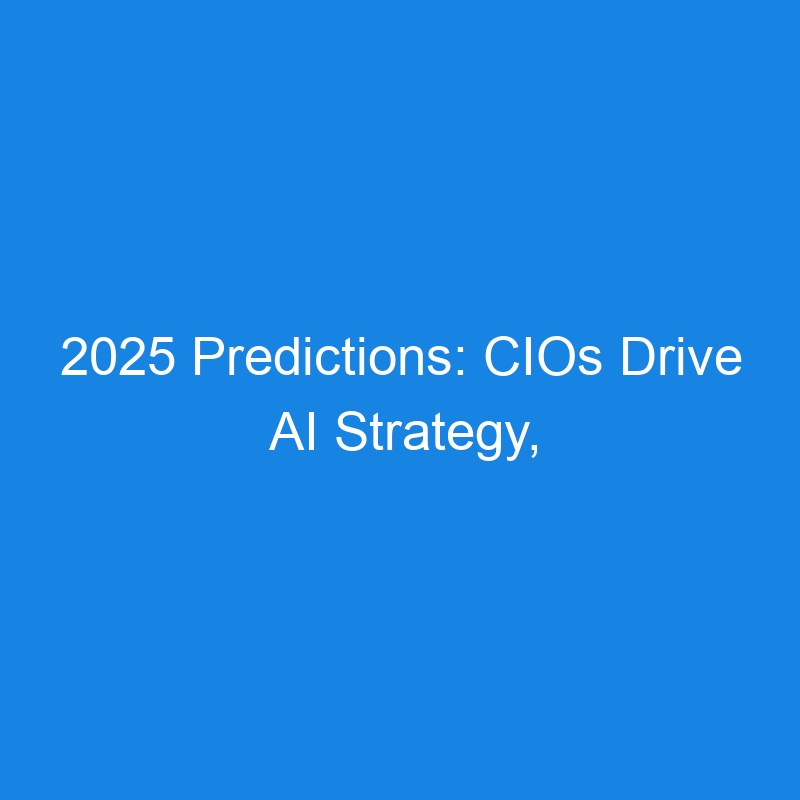
2024 has been a momentous year across the technology sector.
The AI boom has given way to more widespread caution, the July global IT outage hit thousands of businesses and increasingly stringent regulations such as the Network and Information Security Directive (NIS2) and Europe’s upcoming Digital Operational Resilience Act (DORA) have pushed organizations to revamp their incident reporting to ensure compliance.
2025 promises to be an equally significant year and organizations must ensure they can keep pace with change to remain successful. Here’s what PagerDuty experts see in the tea leaves for 2025.
The CIO’s Role Will Continue To Evolve
As next-generation technologies are increasingly adopted by organizations, the day-to-day job of the CIO will shift toward having a greater strategic influence.
Eric Johnson, CIO at PagerDuty, predicts that CIOs will be among the most pivotal members of the C-suite in 2025. The CIO will be responsible for spearheading the organization’s digital innovation, including orchestrating the integration of AI, quantum computing and advanced analytics to forge new business models and revenue streams. The CIO’s unique ability to translate technological capabilities into business outcomes will make them indispensable in board-level decisions, directly shaping company strategy and driving digital-first transformations across all operations.
As part of this strategic shift, the CIO will also become the organization’s de facto chief AI officer, responsible for managing the organization’s entire AI ecosystem. The CIO will lead advisory related to AI and work in collaboration with legal, compliance, security, HR and the C-suite. CIOs will pioneer “AI impact assessments” as a standard practice before any AI tool is deployed, balancing innovation with risk management.
Automation and AI To Drive Strategic Decision-Making
In a similar vein, as process automation and AI tools become more widely adopted and trusted across organizations, members of the C-suite will increasingly use them to support their strategic decisions.
Eduardo Crespo, vice president of EMEA, predicts that advanced automation, analytics and AI capabilities will power the CIO’s decision-making, helping them play an even more strategic role. This will enable the CIO to drive faster reactions to industry trends and truly enable an agile enterprise. Additionally, the experience gained from 2024 will help CIOs, together with CTOs, distinguish AI hype from reality and produce tangible results for customers.
Additionally, CIOs will act with greater digital maturity and agility based on performance metrics rather than hype, demonstrating improved business performance and financials.
Finally, as AI use becomes more prevalent, organizations will need to reinvent what trust means for their customers. With processes now happening “automagically” through low-touch automation, policy and communication will become critical in ensuring that trust is built and maintained and that the people within the organization are properly harnessed and highlighted.
Improving Operations Through ‘Everything As Code’
Manual operations are already outdated, and 2025 promises to accelerate the trend toward increased automation and AI use.
Heath Newburn, global field CTO, predicts that site reliability engineering (SRE) and DevOps teams will see “everything as code” becoming AI-guided and AI-driven to a greater extent. Automation will evolve from a tool used by specialized teams into a foundational business capability on par with security or compliance functions. As automation becomes more widespread, operations centers will move away from a “butts in seats” framework to a distributed, AI-assisted automation-led model, allowing teams to solve more problems at first touch.
Finally, 2025 will see operations-as-code evolve and allow organizations to automatically manage and track their operational standards. This will drive more secure, timely compliance reporting and help organizations reduce the risk of censure or fines from regulatory bodies.
Operational Streamlining Will Remain Front of Mind
Tim Chinchen, director of solution consulting, predicts an increased autonomous/zero-touch operations goal for all business-as-usual operations as organizations take advantage of AI technologies, including generative AI and machine learning. Through this approach, organizations will allow employees to focus on value-add work, such as driving innovation, rather than on the manual toil created by manual operations processes.
The Goal of Constant Improvement Is To Drive Change
As operational efficiency and more effective incident remediation become increasingly expected as the norm, especially as the cost of incidents continues to rise, organizations will react accordingly to safeguard their business using AI and automation tools. Check back in at the end of next year to see which of our experts’ predictions came true.
The post 2025 Predictions: CIOs Drive AI Strategy, ‘Everything as Code’ appeared first on The New Stack.
